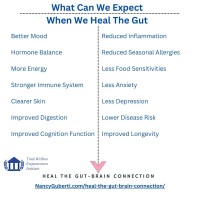
The microbiota-gut-brain axis is a fascinating and complex network of communication pathways that connect the gut microbiome and the brain.
Here are some key points about this axis and its impact on health:
Bidirectional Communication: The microbiota-gut-brain axis involves two-way communication, meaning the brain can influence gut function, and the gut microbiota can affect brain function. This communication is mediated through several systems:
Immune System: The gut microbiota can influence the immune system, affecting brain health and function.
Vagus Nerve: This major nerve is a direct communication line between the gut and the brain.
Enteric Nervous System: Often referred to as the “second brain,” this system consists of a vast network of neurons that govern the function of the gastrointestinal system.
Neuroendocrine System: The gut microbiota can influence the release of hormones and neurotransmitters and impact brain function.
Circulatory System: Metabolites produced by gut bacteria can enter the bloodstream and affect the brain.
Health Implications:
Autism Spectrum Disorders (ASD): Alterations in the gut microbiota have been linked to the development and severity of ASD. Studies suggest that specific bacterial profiles may be associated with ASD symptoms.
Anxiety and Depression: There is growing evidence that gut microbiota can influence mood and behavior. Imbalances in gut bacteria have been associated with increased anxiety and depressive-like behavior.
Neurodegenerative Diseases: Conditions like Parkinson’s, Alzheimer’s, and multiple sclerosis have been linked to changes in gut microbiota. Certain bacteria may influence the aggregation of proteins associated with these diseases.
Physical Performance and Motivation: The gut microbiota can affect physical performance and motivation, potentially producing metabolites that influence energy metabolism and brain function.
Understanding the microbiota-gut-brain axis opens up new avenues for potential treatments and interventions for various neurological and psychiatric conditions. It highlights the importance of maintaining a healthy gut microbiome for overall brain health.
Heal The Gut
When you heal the gut, you can expect a wide range of health benefits that extend beyond just digestive health. Here are some key improvements you might experience:
Digestive Health:
Improved Digestion: Better breakdown and absorption of nutrients, leading to more efficient digestion.
Reduced Bloating and Gas: Alleviation of uncomfortable bloating and gas symptoms.
Regular Bowel Movements: Improved stool consistency and frequency, reducing constipation or diarrhea.
Immune System:
Enhanced Immunity: A healthier gut microbiome supports a more robust immune system, helping you fend off infections and illnesses.
Reduced Inflammation: Lower levels of chronic inflammation can decrease the risk of various inflammatory diseases.
Mental Health:
Improved Mood: Better gut health can reduce anxiety and depression symptoms due to the gut-brain connection.
Enhanced Cognitive Function: Improved mental clarity, focus, and overall cognitive performance.
Skin Health:
Clearer Skin: Reduction in skin conditions such as acne, eczema, and psoriasis, as the gut-skin axis plays a significant role in skin health.
Radiant Complexion: Healthier gut function can lead to a more vibrant and youthful appearance.
Metabolic Health:
Weight Management: Improved metabolism and more balanced blood sugar levels can help manage weight.
Increased Energy Levels: Better nutrient absorption can lead to higher energy levels and reduced fatigue.
Cardiovascular Health:
Lower Cholesterol Levels: A healthier gut can help reduce harmful cholesterol levels, supporting heart health.
Better Blood Pressure Control: Reduced inflammation and improved metabolic function can contribute to healthier blood pressure levels.
Overall Well-being:
Stronger Resilience to Stress: A balanced gut microbiome can improve your body’s response to stress.
Better Sleep: Improved gut health can improve sleep quality and patterns.
Disease Prevention:
Lower Risk of Chronic Diseases: Reduced inflammation and better immune function can lower the risk of chronic diseases such as diabetes, cardiovascular disease, and certain cancers.
Improved Longevity: Overall, better health and reduced risk of diseases can contribute to a longer, healthier life.
Healing the gut can improve comprehensive health, emphasizing the importance of maintaining a healthy and balanced gut microbiome.
Unlock the secrets to optimal health and longevity with our comprehensive stool analysis, designed to provide invaluable insights into your gut-brain connection and pave the way for a healthier, longer life.
Tags: comprehensive stool analysis, Functional Medicine, gut health, gut-brain connection, mental health, Nancy Guberti
Leave A Reply (2 comments So Far)